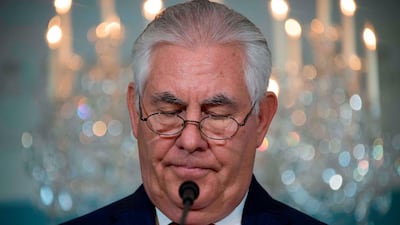The wave of resignations and firings from US President Donald Trump's White House claimed its latest high profile victim yesterday. Mr Trump sacked Secretary of State Rex Tillerson with a tweet, ending the former businessman's ineffectual 13-month tenure. Their parting of ways follows a series of disagreements and will surprise few, coming from a president who values loyalty above all else. Ahead of momentous and unprecedented talks with North Korea, Mr Trump needs a Secretary of State he can trust. Mr Tillerson's replacement, CIA director Mike Pompeo, appears to fit the bill. Some viewed him as a calming influence in a frenzied administration. Meanwhile Mr Tillerson – who on being appointed last year, admitted he never wanted the job – leaves the state department in disarray and without a major accomplishment to his name.
This month, simmering tensions between him and the president appeared to reach boiling point. While Mr Trump suggested North Korea might terminate its nuclear programme, Mr Tillerson said the two nations were "a long way from negotiations". That followed a rift last October when Mr Trump chastised Mr Tillerson for "wasting his time" trying to negotiate with Pyongyang. This week, after US press secretary Sarah Huckabee Sanders stopped short of blaming Russia for poisoning a former spy in Britain, Mr Tillerson went so far as to say it would "certainly trigger a response" from the US. It appeared to be the final nail in his career coffin as Mr Trump has refused to criticise the Kremlin amid swirling collusion allegations. The two have been at odds on numerous issues, including Mr Trump's decision to move the US embassy to Jerusalem, and they have failed to agree on the Iran nuclear deal. While Mr Tillerson shortsightedly urged Saudi Arabia and allies in the quartet to end their boycott of Qatar, Mr Trump named Doha "a funder of terrorism at a very high level".
Meanwhile, business-minded Mr Tillerson has overseen the gutting of the state department, where morale has nosedived. According to the Democrats in the house foreign relations committee, more than 100 senior department officials resigned last year alone. The US currently lacks an ambassador to South Korea and a special representative for North Korean policy. Mr Tillerson is not entirely to blame; at the behest of the White House, his department has yielded authority to the Pentagon. Nonetheless his poor management is starting to be felt in the department's capacity to advance American interests abroad, creating power vacuums into which Iran and Turkey have lurched. Ahead of pivotal talks with Pyongyang, instability seems ill-advised. But few in Washington will mourn a rather ineffectual Secretary of State, whose departure never looked far away.

